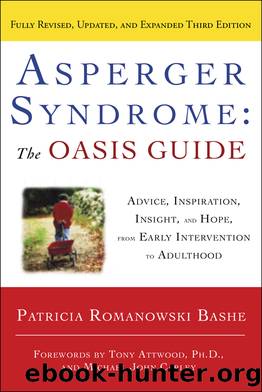Asperger Syndrome by Patricia Romanowski Bashe

Author:Patricia Romanowski Bashe [Romanowski Bashe, Patricia]
Language: eng
Format: epub
ISBN: 978-0-8041-4148-2
Publisher: Harmony/Rodale
Published: 2014-10-14T00:00:00+00:00
TELLING YOUR CHILD ABOUT MEDICATION
This is a complex, sensitive area for many parents and children. Considering the increase in children taking psychotropics, surprisingly little has been written about it. When, how, and how much you tell your child will depend on many factors: your child, her level of understanding of AS and her behavior, the type of medication sheâll be taking, and the circumstances under which sheâll be taking it. Every situation is different, and you may wish to discuss how to proceed with your childâs prescribing doctor, who, we hope, will have seen many other families through this dilemma.
Overall, itâs important to discuss this issue in a way that your child will understand. This may be easier if you and your child have already discussed his problems, whether or not you have told him about his actual diagnosis. However, simply because you have never talked to your child about some of his behaviors or told him that he has AS, donât feel pressured to do it right now. Depending on your childâs age and level of understanding, it may suffice to say, âI know youâve been feeling very anxious lately; Dr. Ferry and I believe that this medicine might help with that.â
If you are considering medication, chances are itâs because your child is having difficulty. In addition to the problems related to AS, your child may be experiencing embarrassment, guilt, or shame over his feelings or behavior. Itâs not unusual for a child who has been acting out, having trouble relating to peers, or failing in school to feel âstupid,â âdumb,â âbad,â or worse. The idea that faulty brain chemistry beyond our conscious control is at the root of many problems can be reassuring to parents and perhaps even older adolescents. (âItâs not your fault; your brain works differently.â) Younger children, however, may find that prospect more frightening.
Then there is the simple fact that your child will be taking medicine, and all but the very young realize that this is what you do when you are âsickâ or âsomething is wrong.â By this point, most children strongly suspect or know they are different, and different in ways that not everyone totally accepts. In a brief paper published in the Journal of the American Academy of Child and Adolescent Psychiatry, Drs. Nancy Rappaport and Peter Chubinsky wrote: âEven if the clinician has reassured the parents, children are also often apprehensive about taking medication and commonly believe that this is final proof that they are defective. Although they may not initially express these thoughts, many children will at some point call themselves âcrazy,â âbad,â or âstupidâ as an explanation for why they are taking medication. Others may fear that they are brain-damaged.⦠Some children will obstinately reject medication rather than tolerate the daily reminder of their perceived defect.â26
On the other hand, some children do see and feel the difference the right medication makes. Given positive cues by parents, doctors, and teachers, children can adapt to their need for medication without it adversely coloring their self-image.
Download
This site does not store any files on its server. We only index and link to content provided by other sites. Please contact the content providers to delete copyright contents if any and email us, we'll remove relevant links or contents immediately.
| Allergies | Asthma |
| Autism & Asperger's Syndrome | Cystic Fibrosis |
| Down Syndrome | Eating Disorders |
| Epilepsy | Learning Disorders |
| Lice | Special Needs Children |
I Capture the Castle by Dodie Smith(2038)
The Heavy by Dara-Lynn Weiss(1810)
Aspergirls by Rudy Simone(1699)
Be Different by John Elder Robison(1650)
Autism's False Prophets by Paul A. Offit(1538)
My Child's Different by Elaine Halligan(1516)
Smart but Scattered—and Stalled by Richard Guare(1501)
101 Tips for the Parents of Boys with Autism by Ken Siri(1495)
Asperger Syndrome (Autism Spectrum Disorder) and Long-Term Relationships by Ashley Stanford(1427)
What's Making Our Children Sick? by Michelle Perro(1416)
ADHD by Mark Selikowitz(1394)
Girlish by Lara Lillibridge(1388)
On Immunity: An Inoculation by Biss Eula(1362)
An Adult with an Autism Diagnosis by Gillan Drew(1355)
Nerdy, Shy, and Socially Inappropriate by Cynthia Kim(1352)
Animal-assisted Interventions for Individuals with Autism by Temple Grandin(1332)
The Cities by K.A Knight(1317)
Sarah's Child (Hqn Romance) by Linda Howard(1314)
Seeing Ezra by Kerry Cohen(1307)
